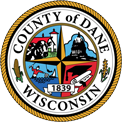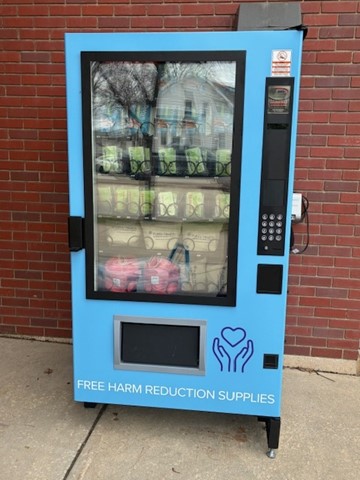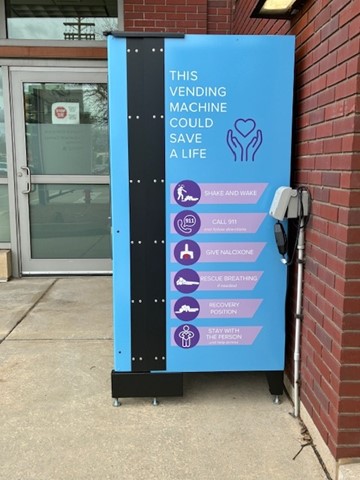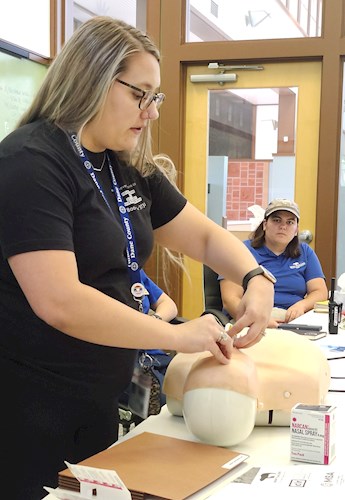
According to the National Harm Reduction Coalition, Harm Reduction is a set of practical strategies and ideas aimed at reducing negative consequences associated with drug use. Harm Reduction is a movement for social justice built on a belief in, and respect for, the rights of people who use drugs. Harm Reduction does not encourage use, but accepts (for better or worse) that licit and illicit drug use is part of our world, and chooses to work to minimize its harmful effects rather than simply ignoring or condemning them. Harm Reduction does not attempt to minimize or ignore the real and tragic harm and danger that can be associated with illicit drug use.
Through the 2020 Overdose Fatality Review (OFR) process led by Public Health Madison & Dane County (PHMDC), EMS encounters were identified as an opportunity for intervention to provide individuals at high risk of overdosing with life-saving harm reduction resources. Fully funded by the Opioid Settlement Funds, DCEM collaborates with PHMDC and EMS/Fire agencies in Dane County to provide these supplies to those at high risk of overdose.
Supplies include nasal Naloxone - the life-saving overdose reversal medication - fentanyl test strips, xylazine test strips, a CPR mask, one pair of single-use gloves, and recovery and harm reduction-related resources. They are packaged in a bag called a HOPE (Heroin and Opioid Prevention & Education) Kit.
Kits are provided to patients and their loved ones on scene by EMS after a non-fatal overdose occurs and/or other related substance use concerns come up during the call to service. Community members can request a kit from their local EMS/Fire station.
Fitch-Rona EMS was the first agency to pilot the HOPE Kit program, but all EMS agencies in Dane County are now involved as well. In 2023, 118 HOPE Kits were recorded as distributed (official start date of program was June 27, 2023). In 2024, 249 HOPE Kits were distributed to the community. This initiative is not the only solution, but is a resource in the vast toolbox of overdose prevention strategies.
Through the Overdose Fatality Review (OFR) process led by Public Health Madison & Dane County (PHMDC) in 2020, local hospitals were identified as a system that was being interacted with prior to an overdose death. As PHMDC identified, "Every interaction with a part of the system is an opportunity for intervention."
DCEM applied for a grant through the Wisconsin Department of Health Services (DHS) utilitizing the Opiate Settlement Funds to purchase two Harm Reduction Vending Machiens for placement at local hospitals. DCEM analyzed data from similar vending machines in the area (thank you to Madison Street Medicine and the Dane County Jail), examined EMS ambulance run reports, coordinated with and took tours of local hospital grounds to identify the best location for these machines, and collaborated with staff from PHMDC Syringe Services Program to identify which harm reduction supplies would be most beneficial to People Who Use Drugs (PWUD).
The vending machines are stocked with items that include Naloxone (nasal & intramuscular), fentanyl test strips, xylazine test strips, menstrual supplies, Safer Sex kits, HOPE Kits, and other harm reduction materials. All items are free, as the vending machines are meant to provide these supplies in a low barrier and stigma-free manner. There are QR codes on the machines and on the items that allow people to report problems, provide feedback, take a survey, and find resources in our community.
This resource is not the only solution, but is an option in the vast toolbox of overdose prevention strategies.
Locations:
UW Health - University Hospital Emergency Department, 1565 Highland Ave. Madison, WI 53705
SSM - St. Mary's Hospital (corner of Erin St./Park St. by bus stop), 700 S Park St. Madison, WI 53715


Our office provides naloxone and overdose response training when requested by community organizations. Depending on the number of participants, each training is about one hour in duration. Topics covered include recognizing and responding to an overdose, using naloxone, rescue breathing, etc. Our trainer is a DHS-certified Naloxone trainer and can provide certificates upon request.
In addition to learning about overdose response, participants will also get an opportunity to learn hands-only CPR and choking response taught by DCEM staff in the EMS Division. DCEM capitalizes on the opportunity to provide training on both topics when able as this can help individuals feel prepared in many emergency situations and in turn keep our community safer. Since this is not a full CPR or First Aid course, no formal certificates will be provided.
If your organization is interested in this training, please reach out to Kailey Peterson, Opiate Prevention Specialist, at peterson.kailey@dancounty.gov.

Public Health Madison & Dane County, Syringe Services Program
Public Health Madison & Dane County, Sexual Health Clinic
Never Use Alone Hotline - 1-877-696-1996 or 1-800-484-3731
Journey Mental Health Center, Crisis/Mental Health Emergency - 608-280-2600
Suicide & Crisis Lifeline - 988
Safe Communities Recovery Coach 24/7 Helpline: 608-228-1278
NAMI Dane County - Navigating the Mental Health System in Dane County: Resource Guide